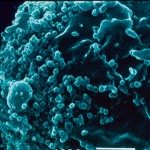Lien vers Pubmed [PMID] – 19275589
Curr. HIV Res. 2009 Mar;7(2):211-7
Placental cytokine balance may be critical for the control of mother-to-child transmission (MTCT) of HIV. We assessed whether the type and duration of antiretrovirals used for prevention of HIV-1-MTCT modified the inflammatory cytokine profile. We investigated the levels of cytokine expression in the placentas of 61 HIV-1-infected women who received zidovudine (ZDV) plus single dose nevirapine (SD-NVP) or ZDV only for prevention of MTCT. Placentas of 38 HIV-1-uninfected women were included as controls. All placentas were obtained after vaginal delivery. Levels of mRNA and cytokine expression were quantified using real-time PCR and ELISA, respectively, in placental explants and 24-hour culture supernatants and analyzed in relation to the women’s characteristics and the type and duration of antiretroviral prophylaxis. HIV-1-infected and uninfected women did not show any differences in the expression of placental cytokine secretion except for a trend toward lower TNF-alpha mRNA levels in HIV-1-infected women. Within the HIV-1-infected group, women who were exposed to a long duration of ZDV (>72 days) or received SD-NVP less than 5h prior to delivery, more frequently expressed detectable levels of IL-10 in their placentas (32% versus 7% (p = 0.01) and 32% versus 5% (p = 0.02), respectively). No infant was found to be HIV-1-infected. Our results showed a normalization of the placental cytokine balance in HIV-1-infected women receiving antiretroviral prophylaxis. Furthermore, the type and duration of antiretroviral prophylaxis have an impact on the placental anti-inflammatory IL-10 expression level, which may contribute to controlling HIV replication at the placental level, thus reducing MTCT of HIV-1.

